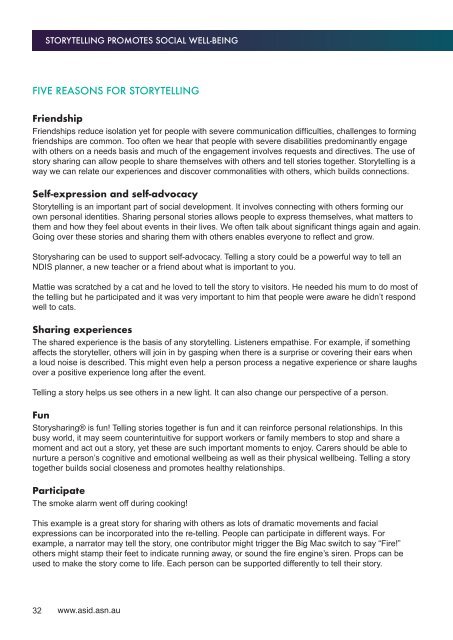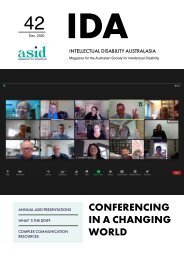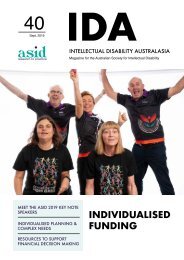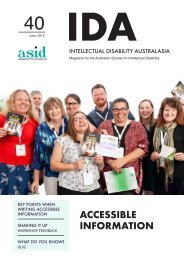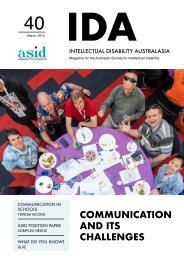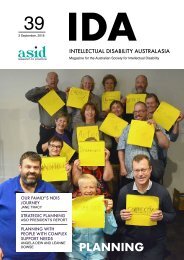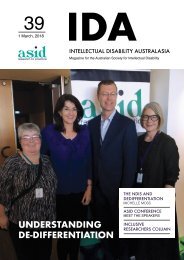IDA Magazine Vol 40 Iss 2 (June 2019)
You also want an ePaper? Increase the reach of your titles
YUMPU automatically turns print PDFs into web optimized ePapers that Google loves.
STORYTELLING PROMOTES SOCIAL WELL-BEING<br />
FIVE REASONS FOR STORYTELLING<br />
Friendship<br />
Friendships reduce isolation yet for people with severe communication difficulties, challenges to forming<br />
friendships are common. Too often we hear that people with severe disabilities predominantly engage<br />
with others on a needs basis and much of the engagement involves requests and directives. The use of<br />
story sharing can allow people to share themselves with others and tell stories together. Storytelling is a<br />
way we can relate our experiences and discover commonalities with others, which builds connections.<br />
Self-expression and self-advocacy<br />
Storytelling is an important part of social development. It involves connecting with others forming our<br />
own personal identities. Sharing personal stories allows people to express themselves, what matters to<br />
them and how they feel about events in their lives. We often talk about significant things again and again.<br />
Going over these stories and sharing them with others enables everyone to reflect and grow.<br />
Storysharing can be used to support self-advocacy. Telling a story could be a powerful way to tell an<br />
NDIS planner, a new teacher or a friend about what is important to you.<br />
Mattie was scratched by a cat and he loved to tell the story to visitors. He needed his mum to do most of<br />
the telling but he participated and it was very important to him that people were aware he didn’t respond<br />
well to cats.<br />
Sharing experiences<br />
The shared experience is the basis of any storytelling. Listeners empathise. For example, if something<br />
affects the storyteller, others will join in by gasping when there is a surprise or covering their ears when<br />
a loud noise is described. This might even help a person process a negative experience or share laughs<br />
over a positive experience long after the event.<br />
Telling a story helps us see others in a new light. It can also change our perspective of a person.<br />
Fun<br />
Storysharing® is fun! Telling stories together is fun and it can reinforce personal relationships. In this<br />
busy world, it may seem counterintuitive for support workers or family members to stop and share a<br />
moment and act out a story, yet these are such important moments to enjoy. Carers should be able to<br />
nurture a person’s cognitive and emotional wellbeing as well as their physical wellbeing. Telling a story<br />
together builds social closeness and promotes healthy relationships.<br />
Participate<br />
The smoke alarm went off during cooking!<br />
This example is a great story for sharing with others as lots of dramatic movements and facial<br />
expressions can be incorporated into the re-telling. People can participate in different ways. For<br />
example, a narrator may tell the story, one contributor might trigger the Big Mac switch to say “Fire!”<br />
others might stamp their feet to indicate running away, or sound the fire engine’s siren. Props can be<br />
used to make the story come to life. Each person can be supported differently to tell their story.<br />
32 www.asid.asn.au


